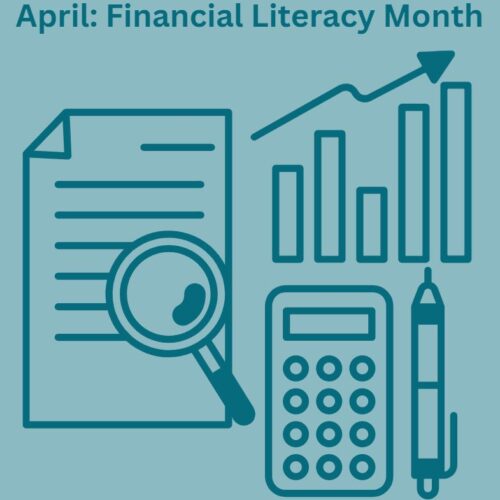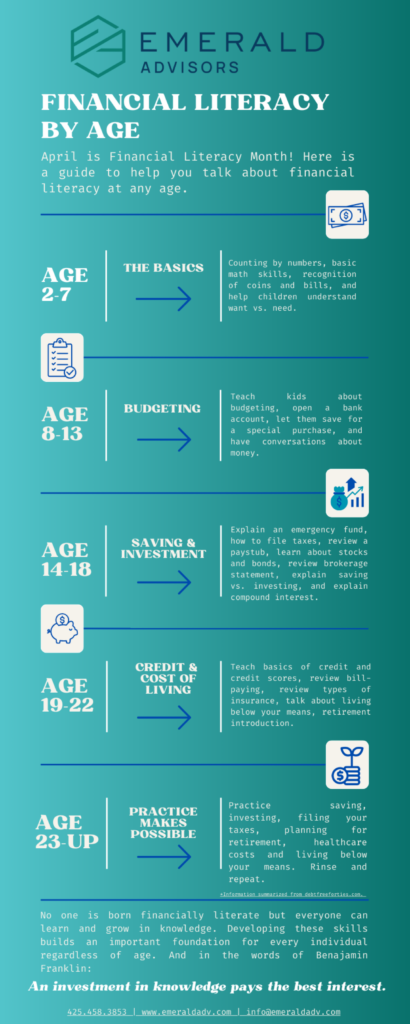April: Financial Literacy Month

April 1, 2023
As April kicks off Financial Literacy Month, Emerald Advisors is excited to share about financial literacy and encourage clients to increase their financial skills. Financial literacy can look very different depending on your age and stage of life. However, you can always keep learning new skills to increase your financial literacy level while sharing what you have learned.
For example, one of our clients worked with us to develop a realistic plan for lifestyle management and future retirement goals. As the client discussed their desire to pass on a legacy to their family, the client realized their adult children could benefit from Emerald and our educational focus. The client made an appointment and brought their grown kids into the office. During the meeting, multiple financial topics were covered. Things like what an investment is, what it means to own company stock, understanding equities vs. fixed income, benefits of retirement planning at the earliest stages of working, and how small changes can turn into healthy financial habits that could result in an oversized impact on their future lifestyle. The parent decided to give the concepts a boost by offering each child a matching incentive if they began saving.
Each topic we touched on is considered a financial literacy concept. Learning and understanding these key concepts create confidence in managing the financial life. By the end of the meeting, these young people knew more and had action steps empowering them to take charge of their financial future. This parent gave their children a great gift by sharing a financial literacy resource — Emerald Advisors. And now, this family’s next generation is making confident small steps toward a more financially literate future.
So what is financial literacy? Why should financial literacy be encouraged and taught? When do you begin teaching financial literacy? How can increasing financial literacy help control thoughts and actions? And how does this apply to you? We will touch on these common questions, so let’s dive in!
What is financial literacy?
Financial literacy is the ability to understand and effectively use various financial skills, including personal financial skills, budgeting, and investing.[i] Being financially literate is a developed skill that can help individuals confidently navigate the many realms of the financial world. From opening a checking account to understanding how to budget according to your income, each skill, when developed, increases the confidence necessary to have a healthy relationship with money.
For Emerald Advisor clients, eMoney is a great resource for creating a budget, calculating your net worth, or playing around with various retirement goals. It’s a one-stop shop where you can check account balances that have been synced while tracking your spending and income.
*If you haven’t logged on yet, contact us, and we will send you the information you need or begin your holistic investment plan today.
Why should financial literacy be encouraged and taught?
As Covid unfolded across the states shutting everything down, it revealed how unprepared most Americans are for an emergency. According to Zippia, a staggering 25 million American adults have no savings at all[ii]. Financial literacy skills such as understanding income versus expenses, how to budget for weekly/monthly bills, and how to start an emergency fund are all vital to the overall health of every American. Teaching financial literacy from a young age is the difference between giving someone a fish and teaching them to fish. The latter is preferred.
When does financial literacy begin?
It’s never too early to teach and learn about financial literacy. We have created a useful infographic on age-appropriate financial literacy topics that you can reference below. But from as early as age two, financial literacy skills are already developing in a child’s life. Children begin by counting numbers and playing with spare change. As we age, money becomes an increasingly present part of everyday life. The complexities around the topic may increase, and our need to continue developing these vital skills does as well. Just think of someone starting their first job that provides a 401(k) plan to the retiree navigating the cost of healthcare. These are only a few examples of how financial literacy is vital to our financial lives and well-being. In today’s age of digital currency, ATMs, and credit cards, it is imperative parents start this educational journey early and often.
How can increasing financial literacy help control thoughts and actions?
You’ve heard it said that knowledge is power. This sentiment is true when it comes to finances. Some people grow up in homes where finances are not discussed and are not exposed to budgeting, writing checks, or even how to file taxes. These are things every child must learn to do once they become an adult. The more someone knows and understands financial literacy, the better prepared they can be to make wise choices with their money and navigate financial matters. Feeling confident in your financial choices can help ease worrisome thoughts and also encourage you to control what you can with the actions you take.
How does this apply to me?
We often hear from couples, parents, and even grandparents that it can be difficult to discuss finances with their spouse, children, or grandchildren. From wondering if couples should have separate accounts or when the right age is to begin discussing money to knowing when to have conversations about wealth transfer from one generation to the next, it’s not always easy.
That’s where Emerald steps in. We see firsthand the layers of complexity that families face. One of Emerald’s goals is to ensure our clients’ whole family is aware of their financial wishes, and we strive to build family relationships that stand the test of time. Some of the ways we do this are by identifying top financial goals, helping clients create or amend a will or trust, and using appropriate tax strategies for maintaining family wealth and also when gifting to family members. At the very least, we think when someone works with an advisor, they should ask three questions:
- Do you have a plan?
- Is it written down?
- What’s our next step?[iii]
When you start working with an advisor, you don’t have to have all the answers or have everything in place when it comes to a financial plan. As time goes on your financial literacy may increase and some of the topics covered here will seem less daunting than they did before. Working with an advisor can alleviate some of the stress and worry around certain financial topics, making your advisor a resource to tap into.
If you don’t have a plan or an advisor, why not book an appointment today? Begin taking steps toward improving your financial literacy today and wake up more confident about your financial future.
P.S. If you want to take your education and preparation to the next level, check out these two sites:
- Khan Academy’s free ‘Life Skills: Financial Literacy’ Course.
- NokBox: An estate planning resource to help your ‘Next of Kin’ be prepared.
[i] Fernando, J. (2022, August 15). Investopedia.com. Financial Literacy: What It Is, and Why It Is So Important. [Online] Available at: Financial Literacy: What It Is, and Why It Is So Important (investopedia.com)
[ii] Flynn, J. (2023, February 16). Zippia.com. 20+ Shocking American Savings Statistics [2023]: Average Personal Savings Accounts, Demographics, and Facts. [Online] Available at: 20+ Shocking American Savings Statistics [2023]: Average Personal Savings Accounts, Demographics, And Facts – Zippia
[iii] Reed, J. (2023, February 22). Fa-mag.com. Family Wealth Transfers Undermined By Secrecy, Cerulli Says. [Online] Available at: Family Wealth Transfers Undermined By Secrecy, Cerulli Says (fa-mag.com)
FREE DOWNLOADABLE INFOGRAPHIC: Financial literacy by age





